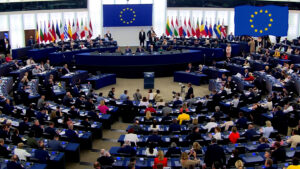By Rodaportal
INTRODUCTION
As we step into the new year, vibrant energy pulses through European communities, sparking a call for action. People increasingly demand their governments to manage migration flows. The urgency arises from a complex reality: a wave of predominantly young male migrants seeking asylum yet showing reluctance to integrate. This not only strains host countries economically but also necessitates extreme measures, including deportations.
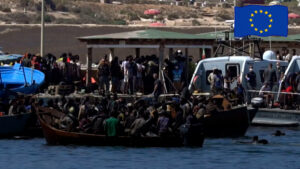
These migrants are drawn not by jobs but by the promise of economic benefits and, worryingly, potential ties to criminal networks. Beyond economics, uncontrolled migration poses multifaceted challenges. It burdens healthcare, education, and social services while creating job competition and social tensions. Security risks loom due to screening loopholes.
Let’s start our journey in France, delving into its intricate immigration landscape and the political showdown facing President Macron’s government. Then, off to Germany, where a draft bill amid a refugee surge sheds light on legislative complexities. Finally, witness a historic moment within the European Union as significant asylum system reforms take shape. It’s an invitation to be front-row spectators to transformative history.
The Multifaceted Debate Across Europe
The immigration debate in Europe is a rich tapestry of contrasting views, from strict security measures to humanitarian ideals. It’s a tug-of-war between safeguarding national security and meeting international responsibilities. Policymakers face the daunting task of balancing these interests without fracturing European unity due to differing approaches among member states.
With the European Parliament elections nearing, the discussions gain momentum, each decision carrying the weight of potential electoral consequences and shaping the EU’s collective stance on immigration. Implementing immigration policies reveals its complexities against a backdrop of legal intricacies and varying interpretations of international agreements.
While urgency drives the need to tackle migration, finding agreement on effective and ethical solutions remains a challenge. Different countries’ interpretations and enforcement of immigration laws, along with their capacity to handle influxes, add complexity. The dynamic global landscape, marked by geopolitical shifts and socioeconomic gaps, further muddles the creation and execution of cohesive and fair immigration policies.
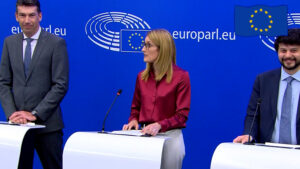
France’s Immigration Conundrum
France’s immigration law has recently made its way through the lower House of Assembly, resulting in a contested victory for Macron’s government. Despite a 349-184 vote in favour of the bill, the victory feels precarious, leaving a sour taste in the ruling party’s mouth, as they are now teetering on the brink of minority status in the lower house. Some left-leaning members expressed unease and were wary of endorsing the bill, as it gained traction from Marine Le Pen’s National Rally, fearing potential political repercussions.
This multi-layered bill tackles diverse and contentious elements of immigration. A major bone of contention was the extension of the waiting period for foreigners claiming benefits in France, setting them apart from French citizens. This sparked intense debate, with Marine Le Pen’s party lauding it as a step toward national preference, but vehemently opposed by left-wing critics as discriminatory.
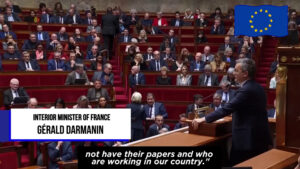
Beyond benefit regulations, the bill cracks down on illegal immigration by penalising it as an offence and introducing measures for expelling illegal immigrants, potentially resulting in fines. Overall, this new immigration law is a significant step forward in regulating immigration in France, but it remains to be seen how it will play out politically.
Additionally, the provision to revoke French nationality for dual nationals convicted of serious crimes sparked considerable debate and dissent within Macron’s party. Macron’s initial proposal for amnesty for undocumented workers underwent substantial dilution, transforming the bill into a more conservative, hardline text. The legislation’s complexity has deepened discord, highlighting a stark division within Macron’s party and fueling passionate parliamentary debates about its alignment with the fundamental values of the French Republic.
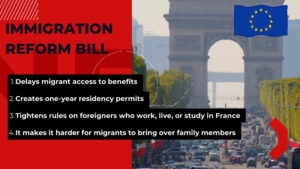
Germany’s Stance and EU Agreements
The German government has unveiled a draft bill targeting the swift repatriation of specific irregular migrants, aiming to streamline the deportation process for those lacking legal permission to remain. Interior Minister Nancy Faeser stressed the need for consistent law enforcement to tackle the rising influx of unauthorized refugees, expected to surpass the 2016 record. Proposed measures include extending detention periods for pending deportations, and granting authorities more preparation time.
Additionally, law enforcement could access migrants’ residences and devices for identity verification and deportation proceedings. Yet, a contentious proposal allows deportations of organized crime affiliates, even without criminal convictions, echoing policies for terrorist group members.
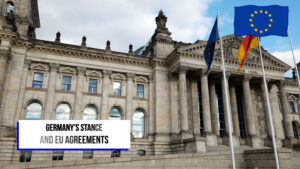
This intensified focus on deportations in Germany unfolds amid a nationwide debate on immigration figures. Anti-migration political factions gain ground, despite the integral role of migration in supporting public services. However, tensions arise due to the recent influx of over 2,700 refugees, mostly from war-torn Ukraine. The far-right party, Alternative for Germany (AfD), holds council seats, fueling polarization around immigration discourse.
Grievances extend to state accommodation centres in Berlin, where refugees, primarily from Ukraine, voice concerns about crowded living conditions. Language barriers and unfamiliarity with German laws prompt reliance on support organizations like the refugee complaints office to navigate administrative hurdles. Despite efforts, inadequate space remains a significant issue, sparking tensions among refugees sharing limited living quarters. Ongoing initiatives aim to tackle housing shortages, ensuring suitable accommodations for incoming refugees in Germany.

Europe at a Crossroads
After years of negotiations, the European Union has finally clinched a groundbreaking agreement on extensive reforms to overhaul its Asylum system, a move hailed as historic by EU lawmakers. This breakthrough follows prolonged discord and political wrangling among member states and factions, showcasing a rare unity among diverse EU parties.
At the heart of these reforms lies a revamped approach to handling irregular migration within the EU. The focus is on bolstering solidarity among member states, ensuring a fairer distribution of migrants and Asylum Seekers across the bloc. The reform introduces a redistribution mechanism, compelling countries to share the responsibility of hosting migrants or provide financial contributions if unwilling to accommodate them.

However, the agreement also brings forth contentious measures to expedite deportations and border vetting. It outlines a process to categorize migrants and Asylum Seekers based on their asylum approval likelihood, including setting up detention centres—a move criticized by human rights groups for potentially fortifying Europe’s borders and diluting shared responsibilities.
Furthermore, the agreement includes contingency plans for crises when sudden waves of migrants inundate EU shores. This provision permits member states to relax certain rules, potentially leading to extended detention periods during such emergencies, raising concerns among human rights advocates. Despite member states celebrating this agreement, it faces challenges ahead, including formal ratification and potential political obstacles amidst upcoming European elections.

Conclusion: The Path Ahead in European Immigration Policies
In our journey through the intricate landscape of European immigration policies, we’ve delved into the nuanced challenges facing key member states. From the complex political dynamics in France to the evolving legislation in Germany and the transformative reforms within the European Union, each facet underscores the weight of this critical issue.
The European Union has reached a pivotal moment with sweeping reforms to reshape its Asylum system. Yet, ensuing debates on solidarity, distribution mechanisms, and contentious measures hint at potential hurdles ahead—formal ratification and political considerations in the upcoming European elections.
Acknowledging the growing frustration among EU citizens regarding persistent migration challenges is crucial. The demand for decisive actions from governments and the EU to address integration concerns, alongside calls for the removal of those failing to integrate with Western Christian culture, heightens the urgency in ongoing immigration policy discussions.
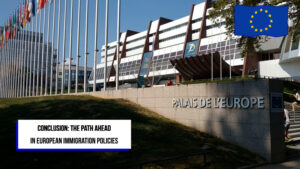
For a deeper dive into this complex topic, consider watching my YouTube video titled “European Immigration Policies: A Complex Quandary” [https://youtu.be/w_HWgu4Wb3U].
Your participation fuels the ongoing dialogue shaping the trajectory of immigration policies. Stay Informed, Stay Engaged, and let your voice resonate. Thank you for your insightful attention, and until our next exploration, keep the conversation going.
